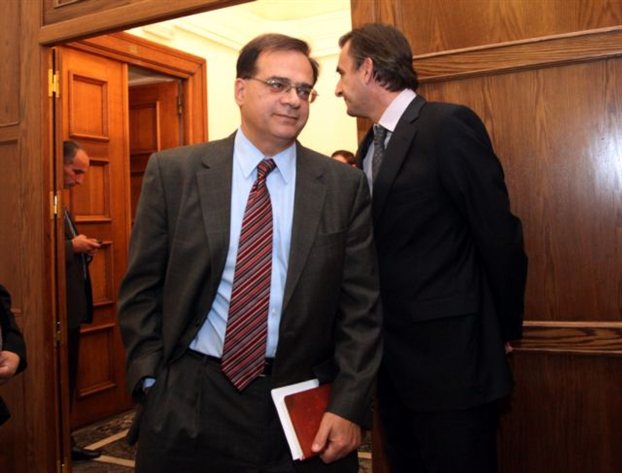Greece’s new finance minister ran into an old set of European grievances about the pace of the country’s economic overhaul, delaying the payout of more emergency aid.
Gikas Hardouvelis, who became Greek finance chief this month, faced demands at his first meeting with euro-area counterparts to step up market deregulation, revenue collection and anti-corruption actions. The result: the creditors refused to release a 1 billion-euro ($1.4 billion) aid disbursement.
“Money will flow only when the conditions are met,” Austrian Finance Minister Michael Spindelegger told reporters yesterday in Luxembourg, where the euro-area gathering took place.
A public backlash in Greece against six years of budget austerity and economic contraction has left the coalition government of Prime Minister Antonis Samaras seeking more wiggle room in its 240 billion-euro rescue. That threatens a repeat of stand-offs that have bedeviled the bailout since it was crafted in 2010.
Greece’s main opposition party, which opposes the fiscal-tightening requirements for aid, came in first in European Parliament elections last month. This highlighted the risk that Samaras, clinging to a four-seat majority in the domestic legislature, will be forced to call national elections before his four-year term ends in 2016.
Samaras responded to the European balloting with a cabinet shuffle that included putting Hardouvelis, a former chief economist at Eurobank Ergasias SA, into the top finance job that Yannis Stournaras had held since mid-2012. Stournaras, now head of the Bank of Greece, helped the country to post a budget surplus before interest and one-time payments in 2013, and to return to bond markets in April.
‘Unusual Progress’
Both those achievements, coupled with the shakiness of the ruling coalition, have given Samaras leverage in the negotiations with creditors on Greece’s success in meeting the rescue terms.
“Greece has made unusual progress in the past years,” German Finance Minister Wolfgang Schaeuble said yesterday. “One has to show a bit of respect for the fact that Greece constantly has to take decisions that are difficult to push through domestically.”
Samaras is emboldened enough to have combined the change of finance minister with the forced resignation of the official in charge of Greece’s public revenue, Haris Theoharis, who was 17 months into a five-year term and had been praised by European officials for improving the country’s chronically weak tax-collection system.
The European Commission expressed “serious concern” at the time about the sudden departure of Theoharis, whose post was created as a result of creditors’ demands.
‘Serious’ Reforms
European Economic and Monetary Affairs Commissioner Olli Rehn yesterday pressed Greece, whose economy is projected to grow this year for the first time since 2007, to stick to the creditors’ policy prescriptions.
“It’s important that Greece will be able to come back to the path of serious economic reforms,” Rehn said. “That’s been the way to stabilize the economy.”
Europe’s stick-and-carrot rhetoric to get Greece through its rescue has been mirrored by the policy mix. In addition to imposing unpopular controls on public spending, the program gave Greece relief through the biggest-ever writedown of privately held debt and cuts in interest rates on public-sector loans.
The 1 billion-euro disbursement that’s on hold is part of an 8.3 billion-euro tranche approved by the euro area in principle in April. Of that, 6.3 billion euros have been paid out. A second 1 billion-euro disbursement is tied to further conditions.
Hardouvelis, the sixth Greek finance minister since the start of the debt crisis, said the country aims to qualify for the first of the two 1 billion-euro payouts by the end of June and for the second sometime in August.
“I have set a target,” he said.
Debt Relief
As it negotiates to qualify for these payouts, the Greek government is also seeking extra debt relief from its euro-area partners following a promise they made in 2012 to “consider further measures and assistance” for Greece once it achieved a primary budget surplus.
Dutch Finance Minister Jeroen Dijsselbloem reiterated that this debate will take place closer to the end of the year. He also said the leeway for further relief is limited.
“There might be room, but that’s also not easy,” said Dijsselbloem, who chairs meetings of euro-area finance ministers.









